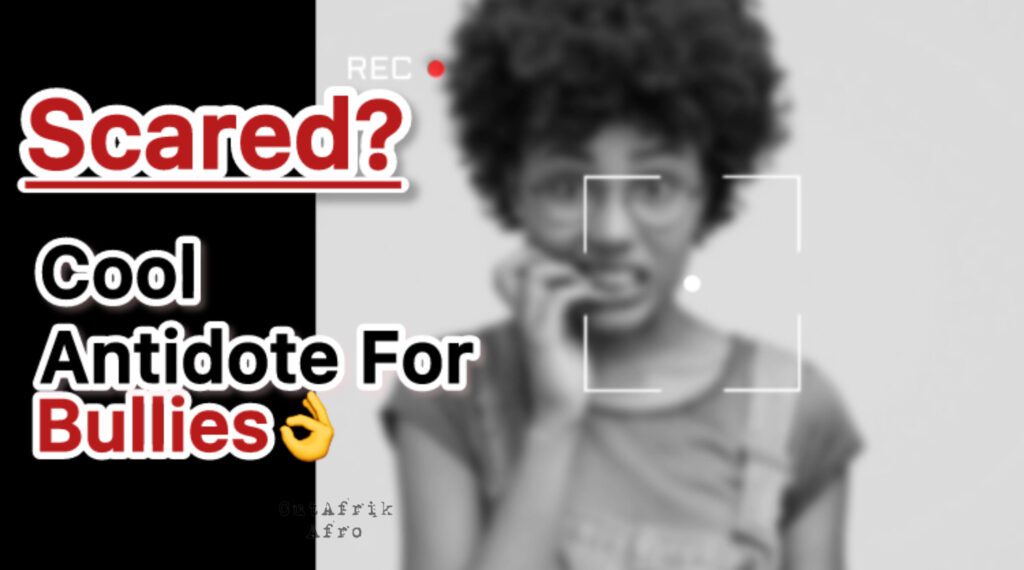Bullies Are Also Watching. Spot Them, Shield Yourself, Stay Focused.

I’ve been there and also seen loud voices go silent, bright minds seek help, and strong people break — all from bullying. This can drain your energy, push you to the limit, even suicidal.
Bullies don’t always look rude or tough. Sometimes they’ve got the best smile in the room—and that’s what makes them dangerous. Charm isn’t kindness. Pay attention to how people repeatedly treat you when no one’s watching.
The key is: it’s not just one rude moment — it’s a pattern meant to tear someone down.
Yes, bullying can mess with more than just your confidence. It can affect how you show up, leave emotional scars, and even damage relationships — all while no one has noticed.
Who is this Bully?
A bully is someone who repeatedly uses their power—physical, emotional, verbal, or social—to harm, intimidate, or control another person. This behavior can happen in person or online. It is common for online bullies to intentionally try to provoke or upset others by posting harmful information or offensive content to spoil reputation. The Internet calls them “trolls”.
A bully might:
- Mock, insult, or belittle others
- Spread rumors or lies
- Ignore, exclude, or isolate someone
- Use threats, manipulation, or sarcasm to dominate
- Criticize publicly to embarrass or shame
Bullies can show up at school, work, home, or on the internet—even as silent watchers who never comment, but judge and undermine from a distance.
How to Identify a bully
- Pay attention to the pattern of how people treat you when no one’s watching. Bullies can be charming, popular, and seemingly kind on the surface. Their harmful behavior often hides behind smiles, flattery, or social influence, which makes it harder for others to recognize and call out. Manipulative or covert bullying, like exclusion, gaslighting, or subtle insults, can be just as damaging as the more obvious kind.
- Bullies may encourage mob mentality, urging others to join in the attack so it becomes a pile on. It may be live or online. Online Bullies often post under a fake name and take note, bullies exist—even with small audiences. They may make a lot of negative noise in the comments section or create videos to attack you
- Bullies aren’t just online. Even in real life or professional setting, they often show up as people who subtly undermine, criticize, or provoke. You find e.g. toxic coworkers, confidence snatchers e.t.c.
- They Make “Jokes” That Cut Deep. They disguise shade as humor. They tease your work, appearance, or confidence in a way that feels off—but claim “I was just joking.” Example: “Oh, look who decided to dress up today,” or Why are you so confident? Why are you so beautiful? “Wow, someone’s really trying hard.”
- They Undermine You Subtly e.g. they question your input in meetings only when others are watching or, they repeat your ideas like they were theirs—or brush them off until someone else says them. They want credit without collaboration.
- They Poke at Your Confidence. “You sure you’re ready to lead that?” “That presentation could’ve been tighter, but… good try.”
- They Always Find a Flaw. You finish a big task and instead of “Great job,” you get, “Next time, don’t forget the font size. ”They minimize your wins and magnify your slip-ups.
- They’re two-faced energy. Subtle gossip, low-key comments like, “She’s just doing all that for attention. ”They smile with you, but shade you when you’re not around.
With these identifying marks, are you a bully or a victim, or non?
Dealing with a Bully Tactfully While Protecting Your Energy, Reputation, and Peace
- Don’t React Emotionally — Respond Strategically. Bullies want a reaction. Instead, pause before responding. Stay calm and composed — it throws them off. Example: “Thanks for your input. I’ll take that into consideration.”
- Set Boundaries (Without Explaining Yourself). Be clear and polite: E.g. “I prefer to keep this conversation focused on the task.” Not everyone deserves access to your headspace, even if you share the same workspace. Professional doesn’t mean available. It means focused.
- Use Witness Power. Bullies usually act one way with you and another way around others. Involve neutral third parties when needed. Speak in meetings instead of private 1-on-1s. Loop in a teammate or supervisor for clarity or feedback.
- Address it Directly (if safe and appropriate). If it’s constant and draining: “I’ve noticed some of your comments come off as dismissive. Is there something you’d like to clarify directly with me?” Say it once, calmly. You’re not asking for approval — you’re setting the tone.
- Escalate Through the Right Channels. If it continues, report to a trusted friend, HR or a direct manager, using your documented facts. Emphasize how it impacts workflow and team dynamics — not just feelings.
- Protect Your Peace. Don’t try to win them over — some people thrive on disruption. Focus on your goals, keep showing up well, and align with allies in the space. Let your presence challenge theirs — not your words.
- Limit Your Time and Access (Gracefully). How?
Do:
- Keep conversations short, task-focused, and neutral.
- Use polite exits like: “Let me check with the team on that and get back to you.”
- Choose email or messaging over face-to-face whenever possible (to keep a record and reduce friction).
Don’t:
- Overshare or invite small talk — trolls often feed on personal info or emotional cues.
- Feel obligated to stay in conversations that drain you.
When A Bully Pushes You to a Breaking Point
If a bully pushed you to the limit and you broke down — emotionally, mentally, or even physically — you’re not weak. You’re human. Repeated exposure does take a toll. You Don’t Have to Be Ashamed.
Some bullies don’t just hurt your feelings — they mess with your mind. Breaking down doesn’t mean you failed — it means someone crossed a line repeatedly and your body responded honestly. Pressure builds. Silence adds weight. Bullies test limits.
They push, they poke, they isolate you just enough…until one day, you don’t even recognize yourself. You’re anxious, defensive, snapping at small things…and people start asking, “Why are you acting like that?” But they didn’t see what led up to it. They didn’t see the pressure, the manipulation, the way you were slowly broken down.
Healing is messy. I know of victims who are judged for their reaction than what caused it and that sacks. Remember, your reaction doesn’t make you weak. It means something real happened, and now you’re trying to find your way back.
Whether you cried, shut down, lashed out, or just mentally withdrew — it’s a signal that something needs support, not shame. Your breaking down wasn’t the problem. Their constant picking, poking, and belittling was.
Here’s how you start regaining control, even after a breaking point
- Take a break. It could be a walk, or even a day off if needed. Rest isn’t weakness — it’s a way to fuel for clarity.
- Talk to a safe person, a trusted friend, a manager you trust, HR, a mentor, or even a therapist. “I’ve reached my emotional limit and I need help addressing a situation that’s affecting my performance,” Or, “help me know if my decisions will be helpful”. Some friends may not know how to help exactly coz they are not trained but simply pouring out your heart to someone you trust could help you gain some relief.
- Document What Led to the Breakdown. Write it while it’s fresh — not just the moment, but the pattern. Facts will help you move from reaction to resolution. It will show you what you will no longer tolerate. You’re now awake to what’s unacceptable. Now, you rebuild — with boundaries, self-respect, and receipts.
How to Begin Healing from Trauma (While Managing Triggers)
Yes, it can be traumatizing , not just frustrating. That’s not an exaggeration — it’s emotional harm rooted in manipulation, chronic stress, and feeling unsafe in a space you’re expected to perform in.
And yes, triggers can follow you long after. Certain tones, words, emails, even lighting or body language can send your nervous system right back to that moment — even if you’ve left the situation.
Your body is trying to protect you by staying alert to similar threats. But that hyper-awareness becomes draining and disorienting, especially if you’re trying to heal or move on. You might second-guess yourself, withdraw, or feel rage pop up unexpectedly. That’s trauma — not weakness.
- Validate Your Experience. You’re not “too sensitive.” You were affected because it mattered — and it hurt. You don’t need external permission to call it what it is: trauma. Acknowledging what happened will enable you take care of yourself, and build your ability to cope and thrive despite it.
- Name Your Triggers. Make a gentle list of things that set you off — tone, phrases, environments, facial expressions. The goal isn’t to avoid them forever, but to notice them with compassion when they show up.
- Create Your Own Emotional Safety Plan. Choose one grounding thing you’ll do when triggered: deep breathing, a walk, music, etc. Limit time with people or environments that still feel unsafe — you’re allowed to protect your peace. Block. Mute. Delete. No explanation needed. Your boundaries matter more than their opinions. Create boundaries that protect your peace.
- Talk to Someone Trained (if you can). Therapy isn’t about “fixing” you. It’s about helping you release what you were never meant to carry.
- Transform the Pain into Power (On Your Terms). Your voice, your story, and your wisdom can help others — when you feel ready. Use content, journaling, or creative expression to let it out.
Yes, trauma may leave you dead but gives you insight no one else has.
“I’m not a therapist or a motivational speaker — just someone sharing real experiences from my own journey (and that of friends).
Note: I also want to make it clear — What am sharing with you is grounded in resilience, not bitterness or retaliation. I also think knowing what to expect helps you be more grounded.
If anything in here resonates with your story, please drop a comment. It helps our website. Keep your comments respectful even when criticizing. Remember constructive criticism.
Check this video out for more on how to beat judgement, anxiety and self-doubt.
Light up your day with our products.








Recent Comments